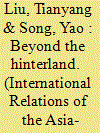| Srl | Item |
| 1 |
ID:
165589


|
|
|
|
|
| Summary/Abstract |
Searching for an alternative founding myth for international relations (IR) entails going back long before the 1648 Westphalian milestone. Drawing from a world historical approach, this article makes the case for investigating the origins of the subject matter of IR in the pre-state era: its founding moment may be traced back to a first encounter between two distinct bands of nomadic Homo sapiens hunter-gatherers in the Palaeolithic period. As the outcome of this interaction was not predetermined, four scenarios are considered: absence of relations by retreat and isolation; conflict triggered by self-preservation (birth of war); cooperation, barter or other types of exchange; and merging together. Following the initial engagement, intergroup relations became much more intertwined. Once the stranger was no longer unknown, the original distinction between Us and Them began to fade away. The ensuing relationship shaped their co-constructed social reality, in a long process of extending trust beyond the family circle.
|
|
|
|
|
|
|
|
|
|
|
|
|
|
|
|
| 2 |
ID:
186177


|
|
|
|
|
| Summary/Abstract |
The scholarly literature on paradiplomacy has tended to focus overly on subnational governments in federal systems rather than those in unitary and centralized countries. However, it is important to note that some subnational governments in these countries have been increasingly proactive in international relations (IR). This study explores the paradiplomatic activities of Yunnan, a province in the south of China which, since the early 1990s, has actively engaged in cross-border cooperation. Combining the concept of paradiplomacy with the theory of actorness, this study first argues that Yunnan has been incentivized to conduct paradiplomacy through the decision of Beijing to open China’s borders; the inefficiency of the central government in managing border-related issues; and the interprovincial competition over economic and diplomatic clouts in the Mekong subregion. Second, this study argues that Yunnan’s new external affairs powers have been consolidated by a host of new opportunities stemming from the external environment. Third, it argues that Yunnan’s new external affairs powers have enabled it to leverage two broad instruments (infrastructure development and economic statecraft) to make neighboring countries more dependent on cooperation with it. And finally, it is argued that Yunnan’s role as an IR player has been acknowledged both by neighboring countries and by Beijing.
|
|
|
|
|
|
|
|
|
|
|
|
|
|
|
|
| 3 |
ID:
108907


|
|
|
|
|
| Publication |
2011.
|
| Summary/Abstract |
The revival of geopolitics in post-1989 Italy is at once a rather straightforward and perplexing matter. On the one hand, the renewed appeal that geopolitical thinking has enjoyed in International Relations (IR) circles has been well documented and could hardly be downplayed. On the other hand, however, the recourse to geopolitics has often boiled down to an undifferentiated and often convoluted use of its terms, approaches and theories. In this article we argue that the rationale of such a revival has been less to import geopolitical knowledge into IR and more to confer legitimacy and respectability to the analyses put forward by scholars and practitioners. It is no chance, in fact, that the geopolitics-inspired academic discourse has been progressively recognised as a way, if not the way, to discuss international affairs in post-1989 Italy. The central puzzle to be investigated behind the revival of geopolitics in Italy is thus how such a discourse has managed to gain and retain a powerful status in Italian IR academia and, most importantly, why.
|
|
|
|
|
|
|
|
|
|
|
|
|
|
|
|